 The 30,000 men recalled from Salerno and the adjacent districts marched towards Capua. The river Volturno, which runs by that fortified town, was now chosen as the line of defence of the Bourbon monarchy.
The 30,000 men recalled from Salerno and the adjacent districts marched towards Capua. The river Volturno, which runs by that fortified town, was now chosen as the line of defence of the Bourbon monarchy.

On the 5th of September the King and Queen with the Austrian, Prussian, Bavarian and Spanish ministers, left Naples for Gaeta on board a Spanish man-of-war. The King issued a proclamation of which the language was dignified and even pathetic: it is believed to have been written by Liborio Romano
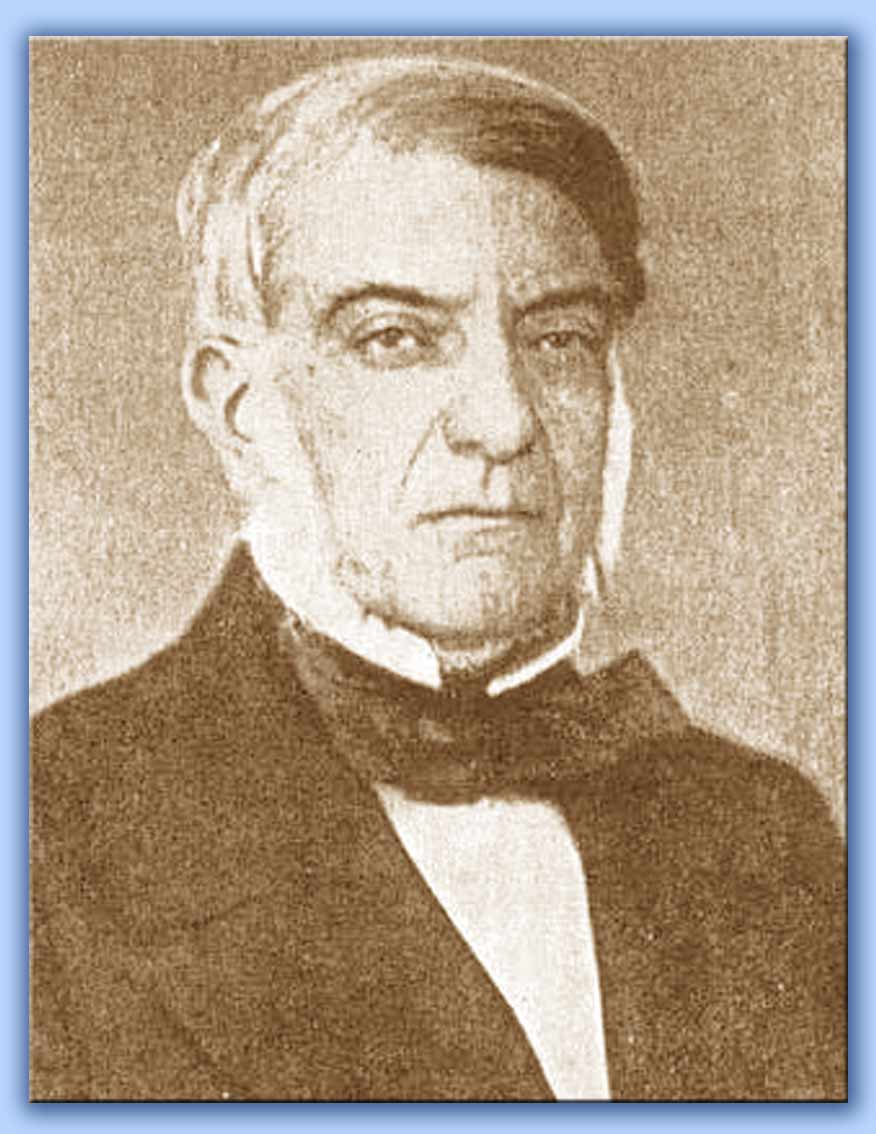 Romano
Romano
the Prime Minister, who was at the same moment betraying his master. Be that as it may, the King's farewell to his subjects and fellow-citizens might have touched hearts of stone could they but have forgotten the record of the hundred and twenty-six years of rule to which he fondly alluded. As it was, in the vast crowds that watched him go, there were not many who said, 'God bless him;' not a woman who shed a tear. Had any one of the bullets aimed at Ferdinand II. taken fatal effect, it would have been a less striking punishment for his political sins than this leaden weight of indifference which descended on his son.
In the Royal Proclamation Francis II. stated that he had adhered to the great principles of Italian nationality, and had irrevocably surrounded his throne with free institutions; nevertheless it is alleged on what seems good authority that in those last days he veered round to the party of the Queen Dowager, who was doing all she could to provoke the lazzaroni to reaction.  It was also believed at Naples that he left orders for Castel Sant' Elmo to bombard the town if Garibaldi entered. The Dictator was so much pleased with Colonel Peard's telegraphic feats at Eboli, that he sent him on to Salerno to repeat the farce. Peard's despatches determined the departure of the Court, and it was to him (in the belief that he was Garibaldi) that Liborio Romano, three hours before the King embarked, addressed the celebrated telegram invoking the 'most desired presence' of the Dictator in Naples.
It was also believed at Naples that he left orders for Castel Sant' Elmo to bombard the town if Garibaldi entered. The Dictator was so much pleased with Colonel Peard's telegraphic feats at Eboli, that he sent him on to Salerno to repeat the farce. Peard's despatches determined the departure of the Court, and it was to him (in the belief that he was Garibaldi) that Liborio Romano, three hours before the King embarked, addressed the celebrated telegram invoking the 'most desired presence' of the Dictator in Naples.  The king
The king
With this document in his hand, Peard went out with the National Guard to meet the real Garibaldi who was on his way from Auletta. The Dictator hailed his double with the cry of 'Viva Garibaldi,' in which Cosenz and the other officers cordially joined. 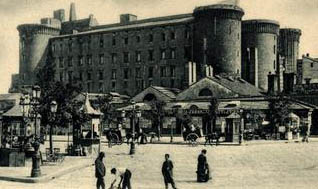 St.elmo
St.elmo
The entry of the Liberator into Salerno was greeted with the wildest enthusiasm, the wonderful beauty of the surroundings seeming a fitting setting for a scene like the vision of some freedom-loving poet. Next morning at half-past nine, Garibaldi, with thirteen of his staff, started by special train for the capital. It must be remembered that though the army of Salerno was recalled to the Volturno, no troops had been withdrawn from Naples.  the king of naples
the king of naples
The sentries still paced before the palaces and public offices, the barracks held their full complement, Castel Sant' Elmo had all its guns in position. These troops quartered in the capital, where everything contributed to stimulate their fidelity, were of different stuff from Ghio's or Caldarelli's frightened sheep; a White Terror, a repetition of the 15th of May 1848, would have been much to their mind.
There had been no actual revolution; nothing officially proved that Naples had thrown off the royal allegiance. Such were the strange circumstances under which Garibaldi, without a single battalion, came to take possession of a city of 300,000 inhabitants. Courage of this sort either does not exist, or it is supremely unconscious. It is likely, therefore, that the Dictator gave no thought to the enormous risk he ran, but his passage from the station to the palace of the Foresteria, where he descended, was a bad quarter-of-an-hour to the friends who followed him, and to whom his life seemed the point on which Italian regeneration yet hung. bourbon regeneration today
bourbon regeneration today
A chance shot fired by some Royalist fanatic, and who could measure the result? As he passed under the muzzle of the guns at the opening of the Toledo, he gave the order: 'Drive slower, slower—more slowly still.' And he rose and stood up for a moment in the carriage with his arms crossed. The artillerymen, who had begun to make a kind of hostile demonstration, changed their minds and saluted.  Bourbon officer
Bourbon officer
The sullen looks of the royal soldiers was the only jarring note in the display of intoxicating joy with which the Neapolitans welcomed the bringer of their freedom; freedom all too easily had, for if anything could have purified the Neapolitans from the evil influences of servitude, it would have been the necessity of paying dearly for their liberties. The delirium in the streets lasted for several days and nights; what the consequences would have been of such a state of madness under a paler sky, it is not pleasant to reflect; here, at least, there were no robberies, no drunken person was seen; if there were some murders, a careful inquiry made by an Englishman showed that the number was the same as the average number of street-murders through the year. At night, when the word passed 'Il Dittatore dorme,' it was enough to clear the streets as if by magic near the palace (a private one) where in a sixth floor room the idol of the hour slept. The National Guard, who were the sole guardians of order, behaved admirably.  For a few days such of the townsfolk as had not completely lost their heads, underwent acute anxiety as they gazed at the frowning pile of Sant' Elmo; but finally the officers in command of the garrison decided to capitulate, contrary, in this instance, to the wishes of the soldiery. The royal troops marched out of the city towards Capua on the 11th of September. Garibaldi's first act had been to hand over the Neapolitan fleet in the bay to Admiral Persano
For a few days such of the townsfolk as had not completely lost their heads, underwent acute anxiety as they gazed at the frowning pile of Sant' Elmo; but finally the officers in command of the garrison decided to capitulate, contrary, in this instance, to the wishes of the soldiery. The royal troops marched out of the city towards Capua on the 11th of September. Garibaldi's first act had been to hand over the Neapolitan fleet in the bay to Admiral Persano , a solemn reassertion of his loyalty to Victor Emmanuel, whom, in his every utterance, he held up to the people as the best of kings and the father of his country. He instructed his Neapolitan officer, Cosenz,
, a solemn reassertion of his loyalty to Victor Emmanuel, whom, in his every utterance, he held up to the people as the best of kings and the father of his country. He instructed his Neapolitan officer, Cosenz, to form a ministry, and wrote to the Marquis Pallavicini, the prisoner of Spielberg, inviting him to become Pro-Dictator. Had a man of authority like Pallavicini, who also entirely possessed the Dictator's confidence, at once assumed that office, much of the friction which followed might have been spared. But he did not enter into his functions till October, and in the meanwhile the 'dualism' of Sicily broke out in an exaggerated form, each side sincerely believing the other to be on the verge of ruining the country to which they were both sincerely attached. The appointment of Dr Bertani as Secretary of the Dictatorship gave rise to controversies which even now, when the grave has closed over the actors, are hardly at rest. It is time that they should be. Apart from the war about persons, some of them not very wise persons, and apart from the fears entertained at Turin, that the freeing of the Two Sicilies would drift into a republican movement: fears which were invincible, though, as far as they regarded Garibaldi, they were neither just nor generous, the question resolved itself, as was the case in Sicily, into whether the unification of Italy was to go on or whether it was to halt? Garibaldi refused to give up Sicily to the King's government because he intended making it the base for the liberation of Naples.
to form a ministry, and wrote to the Marquis Pallavicini, the prisoner of Spielberg, inviting him to become Pro-Dictator. Had a man of authority like Pallavicini, who also entirely possessed the Dictator's confidence, at once assumed that office, much of the friction which followed might have been spared. But he did not enter into his functions till October, and in the meanwhile the 'dualism' of Sicily broke out in an exaggerated form, each side sincerely believing the other to be on the verge of ruining the country to which they were both sincerely attached. The appointment of Dr Bertani as Secretary of the Dictatorship gave rise to controversies which even now, when the grave has closed over the actors, are hardly at rest. It is time that they should be. Apart from the war about persons, some of them not very wise persons, and apart from the fears entertained at Turin, that the freeing of the Two Sicilies would drift into a republican movement: fears which were invincible, though, as far as they regarded Garibaldi, they were neither just nor generous, the question resolved itself, as was the case in Sicily, into whether the unification of Italy was to go on or whether it was to halt? Garibaldi refused to give up Sicily to the King's government because he intended making it the base for the liberation of Naples. Events had justified him. He now refused to hand over Naples because he intended making it the base for the liberation of Rome. It has been seen that he and he alone prevented an attempt at a landing in the Papal states from being made in the month of August. In deciding, however, that it was expedient to finish one enterprise before beginning another, he did not give up Rome: he merely chose what he thought a safer road to go there. And he now declared without the least concealment that he intended to proclaim Victor Emmanuel King of Italy from the Quirinal. Would events have justified him again? There was a French garrison in Rome; this, to Cavour, seemed a conclusive answer. Cavour was engaged on a series of measures, unscrupulous manoeuvres as some have called them,
Events had justified him. He now refused to hand over Naples because he intended making it the base for the liberation of Rome. It has been seen that he and he alone prevented an attempt at a landing in the Papal states from being made in the month of August. In deciding, however, that it was expedient to finish one enterprise before beginning another, he did not give up Rome: he merely chose what he thought a safer road to go there. And he now declared without the least concealment that he intended to proclaim Victor Emmanuel King of Italy from the Quirinal. Would events have justified him again? There was a French garrison in Rome; this, to Cavour, seemed a conclusive answer. Cavour was engaged on a series of measures, unscrupulous manoeuvres as some have called them,  masterpieces of statesmanship as they have been described by others, by which he got back the reins of the Italian team into his own hands. The plan of an annexionist revolution in Naples before Garibaldi arrived had failed. So much discontent was felt at the apparent indifference, or, at least, 'masterly inactivity' of the Sardinian government in presence of the great struggle in the south that Cavour began to be afraid of a revolution breaking out in quite a different quarter, in Victor Emmanuel's own kingdom. It was at this critical juncture that he resolved to invade the Papal states, and take possession of the Province of Umbria and the Marches of Ancona.
masterpieces of statesmanship as they have been described by others, by which he got back the reins of the Italian team into his own hands. The plan of an annexionist revolution in Naples before Garibaldi arrived had failed. So much discontent was felt at the apparent indifference, or, at least, 'masterly inactivity' of the Sardinian government in presence of the great struggle in the south that Cavour began to be afraid of a revolution breaking out in quite a different quarter, in Victor Emmanuel's own kingdom. It was at this critical juncture that he resolved to invade the Papal states, and take possession of the Province of Umbria and the Marches of Ancona. The decision was one of extreme boldness. For three months Cavour had been stormed at by all the Foreign Ministers in Turin, excepting Sir James Hudson, but, as he wrote to the Marquis E. D'Azeglio: 'I shall not draw back save before fleets and armies.' Austria, France, Spain, Russia and Prussia now broke off diplomatic relations with Sardinia. What would be their next act? The danger of Austria intervening was smaller than it then appeared; Austria was too much embarrassed in her own house, and especially in Hungary, for her to covet adventures in Italy. But the French Government did, in the plainest terms, threaten to intervene, and this notwithstanding that the Emperor himself appeared to be convinced by Cavour's argument, that the proposed scheme was the only means of checking the march of revolution, which from Rome might spread to Paris. By announcing one line of policy in public and another in private, Napoleon left the door open to adopt either one or the other, according to the development of events.
The decision was one of extreme boldness. For three months Cavour had been stormed at by all the Foreign Ministers in Turin, excepting Sir James Hudson, but, as he wrote to the Marquis E. D'Azeglio: 'I shall not draw back save before fleets and armies.' Austria, France, Spain, Russia and Prussia now broke off diplomatic relations with Sardinia. What would be their next act? The danger of Austria intervening was smaller than it then appeared; Austria was too much embarrassed in her own house, and especially in Hungary, for her to covet adventures in Italy. But the French Government did, in the plainest terms, threaten to intervene, and this notwithstanding that the Emperor himself appeared to be convinced by Cavour's argument, that the proposed scheme was the only means of checking the march of revolution, which from Rome might spread to Paris. By announcing one line of policy in public and another in private, Napoleon left the door open to adopt either one or the other, according to the development of events.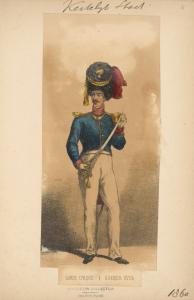
Officer of the Guard Rome 1860
In the sequel, the Papal party had a right to say that he lured them to their destruction, as their plan of operations, and in particular the defence of Ancona, was undertaken in the distinct expectation of being supported by the French fleet. As early as April 1860, the Pope invited the Orleanist General Lamoricière to organise and command the forces for the defence of the Temporal Power, which he had summoned from the four quarters . 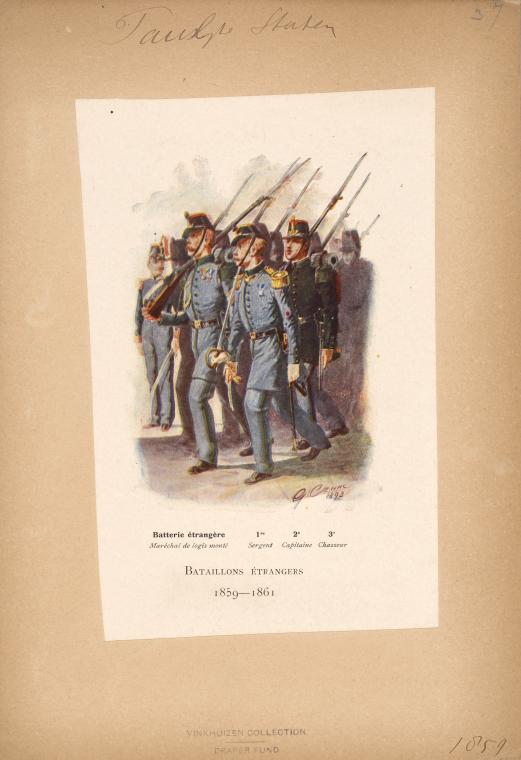 french volunteers
french volunteers
of the Catholic world ,5000 men, more or less, answered the call; they came chiefly from France, Belgium and Ireland. 
Of his own subjects the Pope had 10,000 under arms. In a proclamation, issued on assuming the command, Lamoricière compared the Italian movement with Islamism, a comparison which aroused intense exasperation in Italy, where the rally of a foreign crusade against the object which was nearest to Italian hearts, and for which so many of the best Italians had suffered and died, could not but call up feelings which in their turn were expressed in no uncertain terms.it was an illustration of the old truth—that the Papal throne existed only by force of foreign arms, foreign influence. 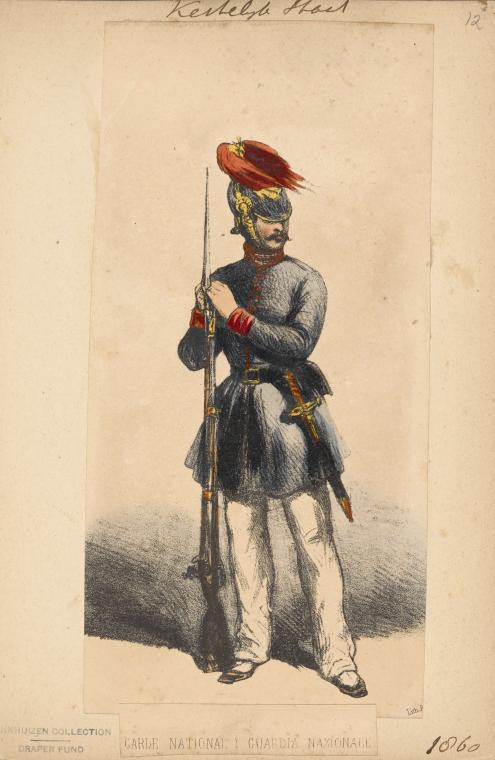
National Guard rome 1860
Lamoricière's 'mercenaries' did much harm to the Pope's cause by bringing home this truth once more to the minds of all. That the corps contained some of the bluest blood of France, that there were good young men in it, who thought heaven the sure reward for death in defence of dominions painfully added in the course of centuries by devices not heavenly to the original patrimony of Peter, did not and could not reconcile the Italians to the defiance thrown down to them by a band of strangers in their own country. 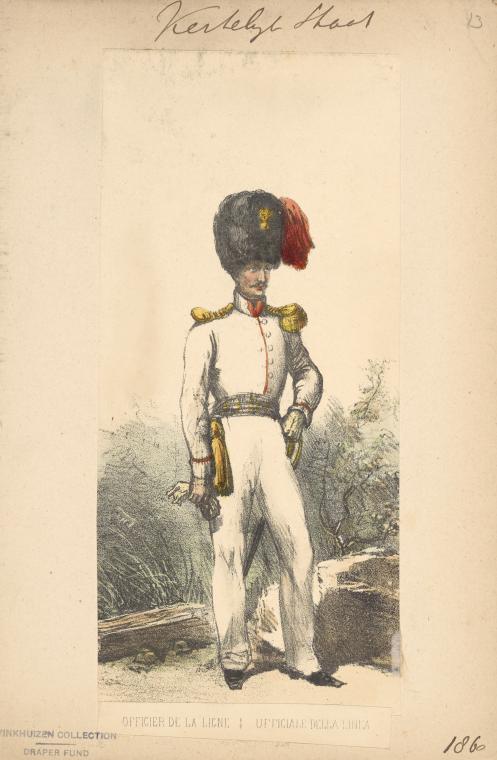
line officer 1860 Roman papal state
Before the opening of hostilities, Victor Emmanuel offered Pius IX. to assume the administration of the Papal states (barring Rome) while leaving the nominal sovereignty to the Pope. Nothing came of the proposal, which was followed by a formal demand for the dissolution of Lamoricière's army, and an intimation that the Sardinian troops would intervene with force . On the 11th of September, symptoms of revolution having meanwhile broken out in the Marches, 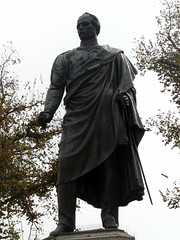 General Fanti( left)in command of 35,000 men crossed the frontier. Half these forces under Fanti himself were directed on Perugia; the other half under Cialdini marched towards Ancona. The garrisons of Perugia and Spoleto were compelled to surrender, and Lamoricière found his communications cut off, so that he could only reach the last fortress in the power of the Papal troops, Ancona, by fighting his way through Cialdini's division, which by rapid marches had reached the heights of Castelfidardo.
General Fanti( left)in command of 35,000 men crossed the frontier. Half these forces under Fanti himself were directed on Perugia; the other half under Cialdini marched towards Ancona. The garrisons of Perugia and Spoleto were compelled to surrender, and Lamoricière found his communications cut off, so that he could only reach the last fortress in the power of the Papal troops, Ancona, by fighting his way through Cialdini's division, which by rapid marches had reached the heights of Castelfidardo. museum of ancona. worth a visit to see the uniforms
museum of ancona. worth a visit to see the uniforms
His men passed the day of the 17th in religious exercises, and in going to confession; the vicinity of the Holy House of Loreto, brought hither by angels from Bethlehem, filled the young Breton soldiers with transports of religious fervour.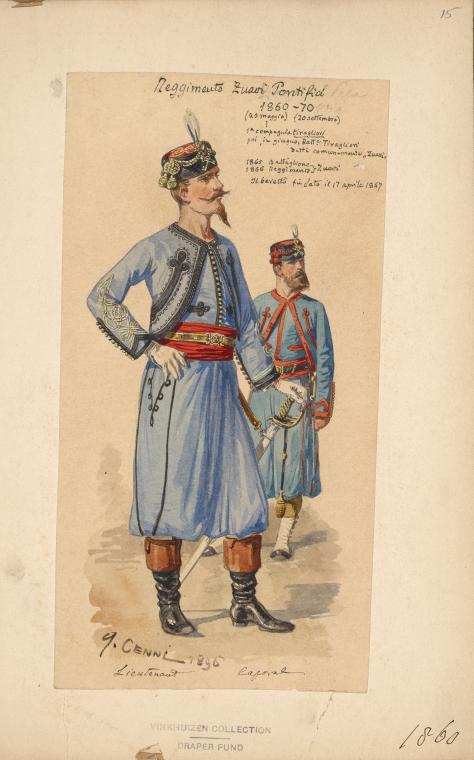
Zouave officer 1860 Rome army
Lamoricière had taken from the Santa Casa some of the flags of the victors of Lepanto to wave over his columns. In the battle of the next day the French fought with the gallantry of the Vendéans whose descendants they were, and the Irish behaved as Irishmen generally behave under fire, but the Swiss and Romans mostly fought ill or not at all. Lamoricière excused the conduct of the latter on the ground that they were young troops; it is likely that they had but little eagerness to fire on their fellow-countrymen.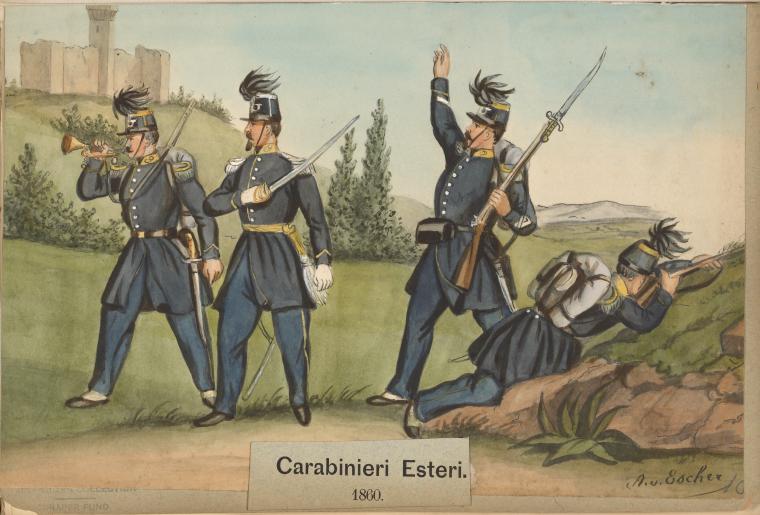 Papal Riflemen of a foreign regiment maybe Irish
Papal Riflemen of a foreign regiment maybe Irish
Being Italians, and above all being Romans, they assuredly were not sustained by one scrap of the mystical enthusiasm of the French: such a state of mind would have been incomprehensible to them. They knew that so far as dogmas went Victor Emmanuel was as good a Catholic as the Pope. It is surprising that with part of his( Fanti above) force demoralised Lamoricière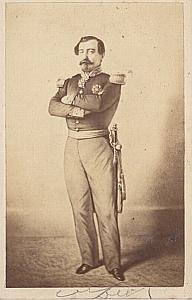 was still able to hold his own for three or four hours. General Pimodan and many of the French officers were killed; Lamoricière could say truly: 'All the best names of France are left on the battlefield.'
was still able to hold his own for three or four hours. General Pimodan and many of the French officers were killed; Lamoricière could say truly: 'All the best names of France are left on the battlefield.' 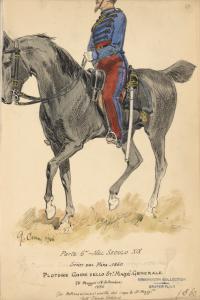
Roman Cavalry 1860 -62
After the victory of Castelfidardo(below),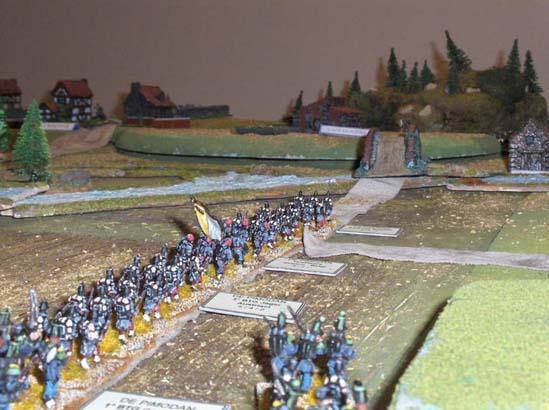 the Sardinian attack was concentrated on Ancona. Admiral Persano brought the squadron from Naples to co-operate with Fanti's land forces, and the fortress capitulated on the 29th of September. The campaign had lasted eighteen days. The Piedmontese held Umbria and the Marches, and a road was thus opened for the army of Victor Emmanuel to march to Naples. During the progress of these events Garibaldi was preparing for the final struggle on the Volturno.
the Sardinian attack was concentrated on Ancona. Admiral Persano brought the squadron from Naples to co-operate with Fanti's land forces, and the fortress capitulated on the 29th of September. The campaign had lasted eighteen days. The Piedmontese held Umbria and the Marches, and a road was thus opened for the army of Victor Emmanuel to march to Naples. During the progress of these events Garibaldi was preparing for the final struggle on the Volturno. Garibaldi in Naples He had not yet given up the hope of carrying his victorious arms to the Capitol, and from the Capitol to the Square of St Mark. The whole republican party, and Mazzini himself, who had arrived in Naples, ardently adhered to this programme. Their argument was not without force, risk or no risk, when would there be another opportunity as good as the present? It was very well for Cavour to look forward, as he did to the day of his death, to a pacific solution of the Roman question; Mazzini saw—in which he was far more clear-sighted than Cavour—that such a solution would never take place. His arrival at Naples caused alarm at Turin, both on account of his presumed influence over Garibaldi, the extent of which was much exaggerated, and from the terror his name spread among European diplomatists. The Dictator Garibaldi was asked to proscribe the man whose latest act had been to give the last 30,000 francs he possessed in the world to the expenses of the Calabrian campaign. He refused to do this. 'How could I have insisted upon sending Mazzini into exile when he has done so much for Italian unity?' he said afterwards to Victor Emmanuel, who agreed that he was right.
Garibaldi in Naples He had not yet given up the hope of carrying his victorious arms to the Capitol, and from the Capitol to the Square of St Mark. The whole republican party, and Mazzini himself, who had arrived in Naples, ardently adhered to this programme. Their argument was not without force, risk or no risk, when would there be another opportunity as good as the present? It was very well for Cavour to look forward, as he did to the day of his death, to a pacific solution of the Roman question; Mazzini saw—in which he was far more clear-sighted than Cavour—that such a solution would never take place. His arrival at Naples caused alarm at Turin, both on account of his presumed influence over Garibaldi, the extent of which was much exaggerated, and from the terror his name spread among European diplomatists. The Dictator Garibaldi was asked to proscribe the man whose latest act had been to give the last 30,000 francs he possessed in the world to the expenses of the Calabrian campaign. He refused to do this. 'How could I have insisted upon sending Mazzini into exile when he has done so much for Italian unity?' he said afterwards to Victor Emmanuel, who agreed that he was right.  Bourbon Palace in 1848. Happier days when the Pope reviewed the troops
Bourbon Palace in 1848. Happier days when the Pope reviewed the troops
However, he allowed the Pro-Dictator Pallavicini to write a letter to Mazzini, inviting him to show his generosity by spontaneously leaving Naples in order to remove the unjust fears occasioned by his presence. Mazzini replied, as he had a perfect right to do, that every citizen is entitled to remain in a free country as long as he does not break the laws. And so the incident closed. While the Party of Action urged Garibaldi not to give up Rome, other influences were brought to bear on him in the opposite sense, and especially that of the English Government, which instructed Admiral Mundy to arrange a 'chance' meeting between the Dictator and the English Minister at Naples, Mr. Elliot, on board the flagship Hannibal. 
degas . naples 1860
Mr. Elliot pointed out the likelihood of a European war arising from an attack on Venice, and the certainty of French intervention in case of a revolutionary dash on Rome. Garibaldi replied that Rome was an Italian city, and that neither the Emperor nor anyone else had a right to keep him out of it. 'He was evidently,' writes Admiral Mundy in reporting the interview, 'not to be swayed by any dictates of prudence.
The Tiella Gaeta It consists, of two pizzas with a filling consisting of products of meat or sea as sausage, fish and vegetables. The history of this dish is linked inextricably to Gaeta. The tiella allowed farmers and fishers to have a full meal that you could keep even for a few days. It is said that King Ferdinand IV of Bourbon was a great admirer, but according to some was the inventor.  The Tiella GaetaIt seems that the King in his visits to Gaeta was amazed by the skill with which the housewife prepared pizza ,developed the double layer of pasta stuffed with fish or vegetables, tiella precisely, which he considered "first, second and third plates."
The Tiella GaetaIt seems that the King in his visits to Gaeta was amazed by the skill with which the housewife prepared pizza ,developed the double layer of pasta stuffed with fish or vegetables, tiella precisely, which he considered "first, second and third plates."
And soon also the aristocracy began to praise, in particular the best ingredients with baby squid, while the more rustic had sardines, anchovies while cod was the most widespread among the poor people.
Is the most famous dish of Gaeta.
His name probably derived from the baking pan in which it is prepared.
Its origins are remote and uncertain
Probably originally a delicacy out of convenience, stuff for poor
It consists of two thin layers of dough, stacked and closed
along the edges with finger pressure to make nice
the appearance.
The stuffing usually consists of calamari or Octopus, but can
use vegetables, vegetables, sar-dine, onions, dried cod; practically
everything offered in the fishing season.
The tiella has a particular taste. Its success depends on
dosage and quality of ingredients used for the filling,
pasta, pace of cooking and of course, inspiration
For the dressing is made use of Gaeta olives, anchovies, garlic, parsley,
bitter Chili, tomatoes, oil, salt. According to tradition, it should be cooked
in the oven baking by special circular.
Prepare dough for 6 people:
-500 gr. flour
-20 g. natural yeast
-3 tbsp olive oil
-200 gr. lukewarm water
-Salt enough
Put yeast, salt and oil in a bowl and mix the whole thing. Gradually add flour until dough is smooth and stack with hands for a quarter of an hour. Dusting the dough with flour, wrap it in a towel and let rise for about half an hour in warm place. Leavening was tapped half and got back with his hands on an axis. With a rolling pin to flatten the dough into a pastry thin, which should never exceed 1 cm. This fact, grease a baking dish with oil in abundance and foderarla with browse prepared. Put on the sheet, evenly, the filling and coating everything with a second sheet of the same thickness of the first. Both sheets are combined with pressure to the circumference of the fingertips to make them binding. At this point grease the tiella thus obtained with abundant oil and plenty of practice with a fork on its surface pinholes caused by the air that forms inside to escape without breaking the Browse. Then the tiella put in hot oven until it took the golden color of cooking.
Recipes
Tiella di onions and Marzolino (fresh goat cheese or sheep):
-500 grams of flour
-750 gr onions
-4 caciottelle
-50 gr of butter, parsley, oil, pepper, grated Parmesan cheese
Prepare the onions in the same way the Escarole. When they are dry, glue them together well with cheese (previously held for twelve hours in cold water to lose salt content) together with the other ingredients above.
Tiella Octopus:
-500 grams of flour
-1 Kg of Octopus boiled and shredded
-50 g capers
-100gr of Gaeta olives, pitted
Drizzle with oil, parsley, chilli and tomato fillet.
Tiella di sardines or anchovies:
500 gr flour
-500 grams of fresh sardines or anchovies
-3 peeled tomatoes
-2 cloves of garlic
-5 tbsp. olive oil
-parsley, pepper, salt
Clean well the sardines, vending and remove the head, open two fillets and remove the fishbones and tail, then ask you to drain and then to dry in a clean cloth.
Pour into a dish of olive oil, garlic, peeled tomatoes well drained, with salt and a pinch of crushed red pepper. Stir well with a wooden Shoveler and add sardines. Stir gently so as not to spoil the fish, and finally those on browse background already in pan. Add the dressing was in the pot and cover with the second sheet.
Tiella di scarole:
-500 grams of flour
-500 g Escarole
-100 g black olives
-50 g capers
-olive oil, parsley, salt, chilli
Shred finely the Escarole, sprinkled with salt and put it to cook for a quarter. Crush the vegetables well prepared well with your hands to remove any water that contains and dress with oil, chilli, parsley, capers, olives, with the addition, for those who like, 150 grams of dried bones removed and cut into coarse pieces
No comments:
Post a Comment